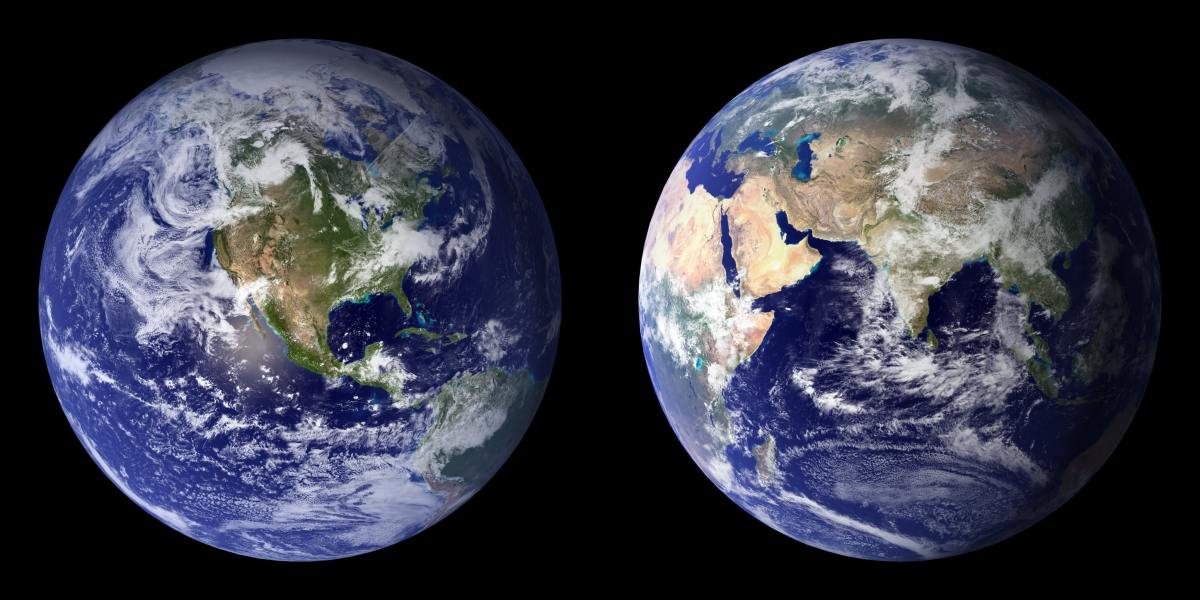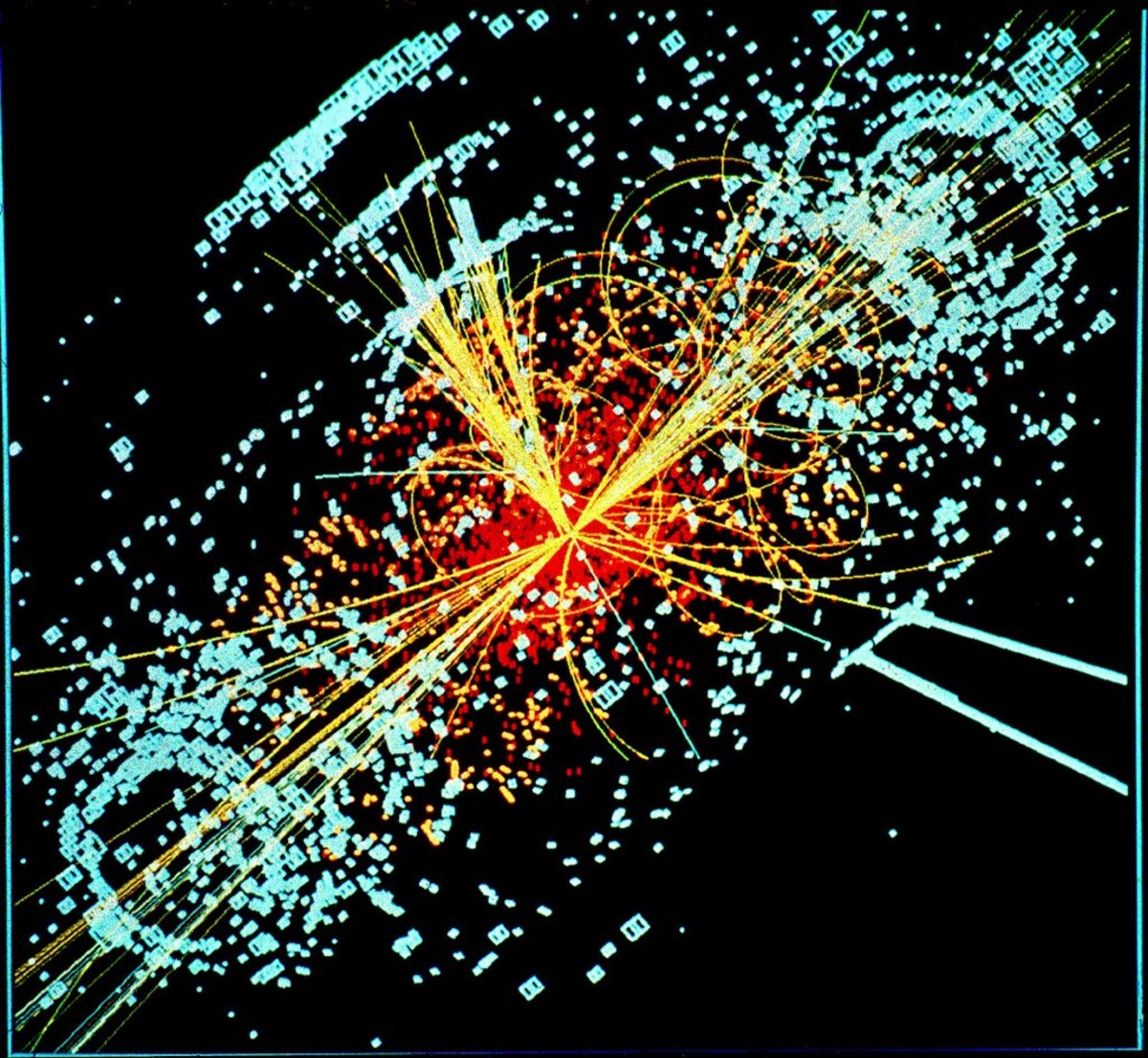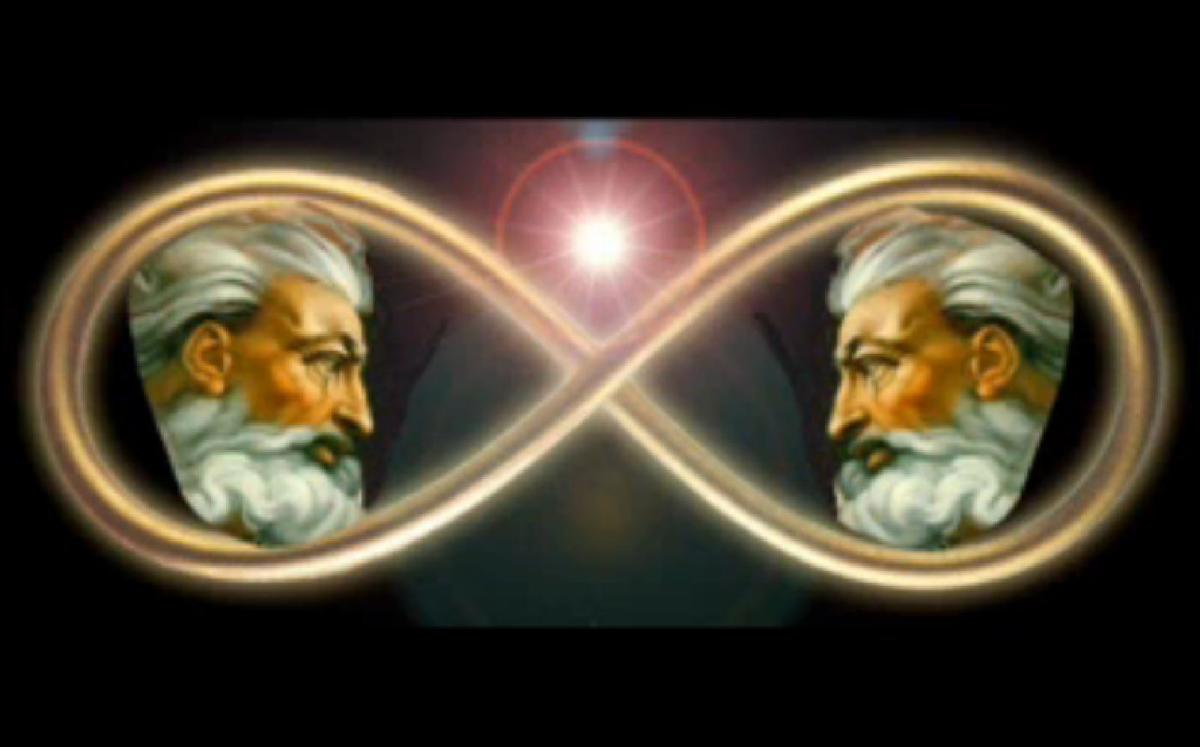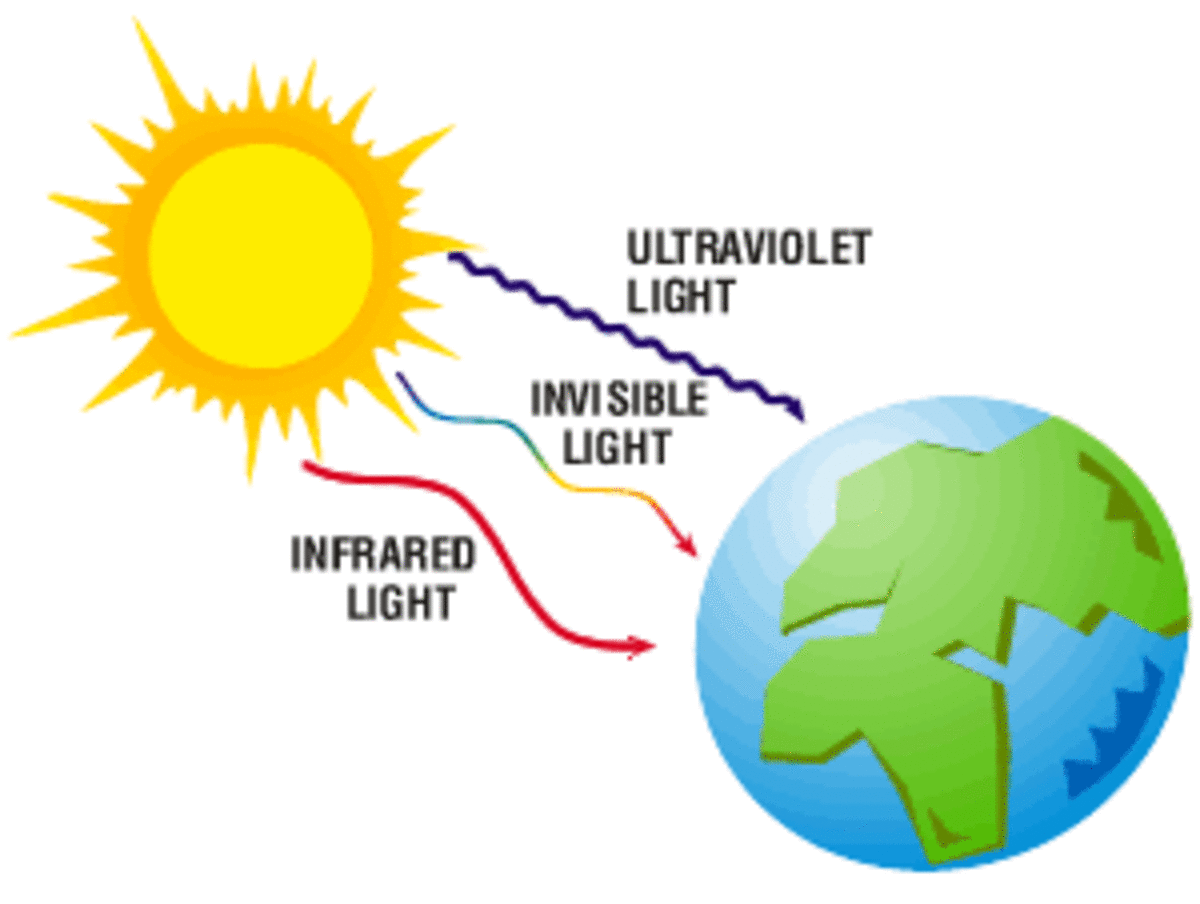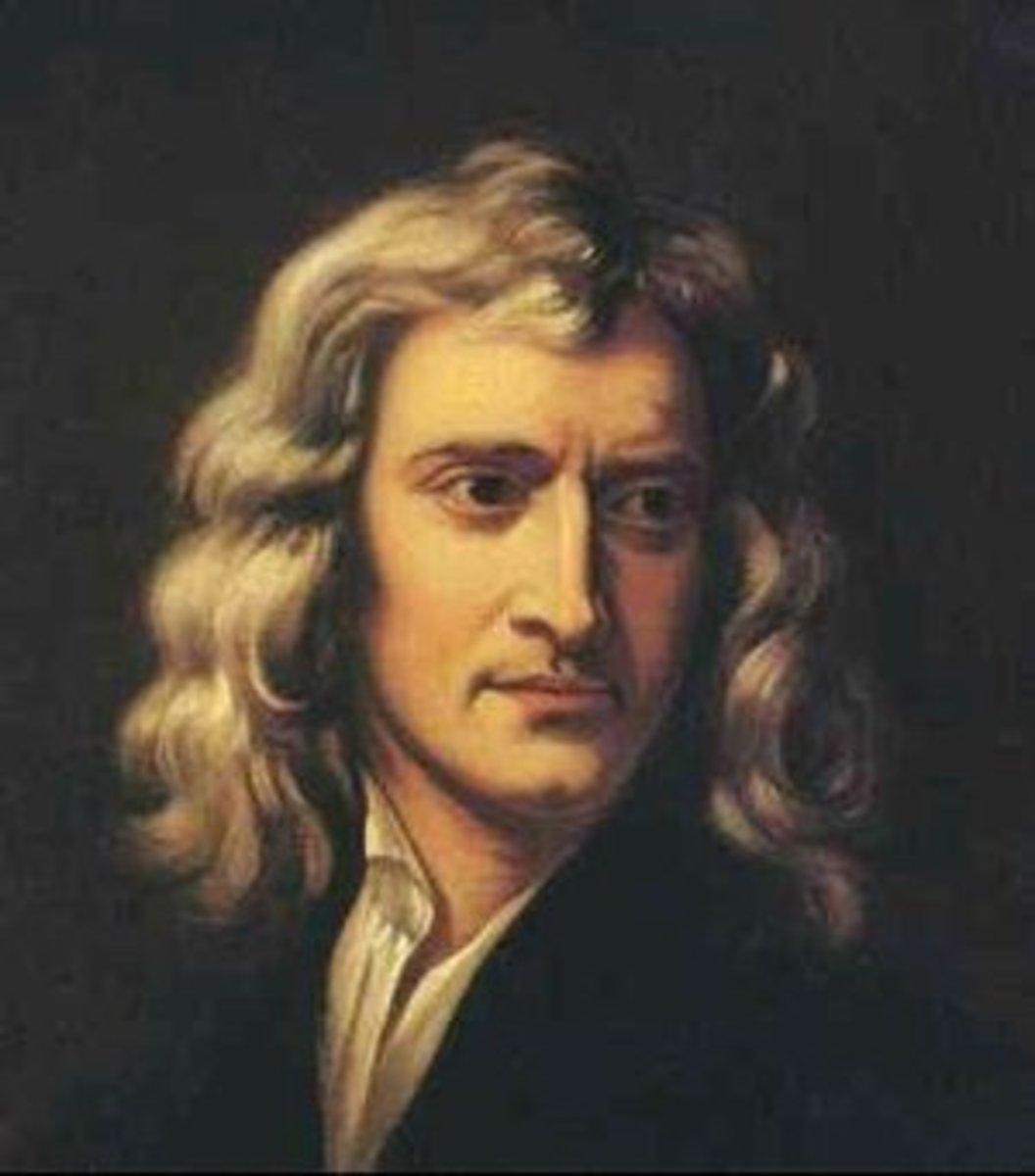Eternal Multiverse, Finite Universe – Paradox Resolved
Why Physicists Need Philosophers
- Why Physicists Need Philosophers
Visit this article on i09 for a great discussion on the need for philosophers of science.
Appellation of God as the eternal

Alpha and Omega
On the rare occasion that an eternal multiverse is discussed, it is promptly eschewed by both religion and science. Religion says that only God is eternal, and science claims that eternity is an unscientific impossibility and rendered moot by recent discoveries. It is impossible that the idea of God can ever be disproven beyond doubt, though science and philosophy may determine it to be highly improbable, even beyond a reasonable doubt. And while the existence of God can never be proven through logic, the idea may be shown to be highly probable despite our inability to quantify it. Thus, God can never be ruled out. There will always be the possibility, however small, that such an entity exists. Anecdotal evidence cannot provide any solace, but our belief may be strengthened by first-hand experience. A scientifically verifiable experience would have to entail a common, simultaneous quality across a broad spectrum of humanity. The social sciences do have a degree of error built in, but, as all of life is founded upon probabilities, high probability can take on the former placeholder for truth.
The human mind has a great propensity for giving meaning to all sorts of experiences – meaning that is not at all inherent in the experience, but entirely subjective. Therefore, even if one has some variety of religious experience, it is all too probable that it is not an external validation but an internal manifestation. That is not to say that all religious experiences are delusions, but as long as they are nebulous, unshared, or unrepeatable they cannot be propounded as any sort of proof. I confess that I choose to believe in a pantheistic God through both hope and logic; possibly a peculiar logic. More on God later.
The Higgs Boson - The "God" particle
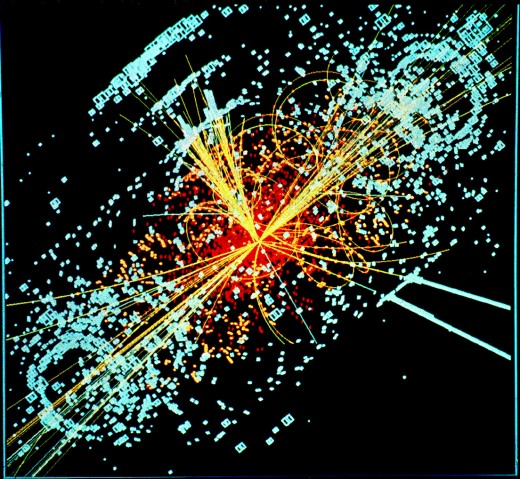
Father of String Theory, Gabriele Veneziano's thoughts on pre-big-bang cosmology
Something from Nothing?
Merriam-Webster defines nothing as:
a : something that does not exist
b : the absence of all magnitude or quantity
Now, personally, I do not see how anything can come of nothing. Not if it’s truly nothing. But most physicists claim just that, and will defend it to their dying breath. There must be something inherent in the nothingness that physicists imagine that allows for such apparent contradiction. Whether it be a creative law (or field of potentialities) or thought, undetectable matter, or energy, that “nothingness” cannot be pure nothingness. And, since there is obviously something (whether we and the universe are figments of God’s imagination or made of some real stuff) this would seem to indicate that the multiverse (cosmos), or at least the inherent potential of a multiverse, the fabric of the cosmos, should have existed forever – there was never nothing.
The vast majority of people believe ours is the only universe. Ironically, for different reasons, most scientists believe the same. How does the mass of humanity, including scientists, explain our universe existing without a cause? It’s the same as the issue with eternity. Most people invoke God. Most scientists eschew God and redefine nothingness to mean a little bit of “somethingness.” The father of String Theory, Gabriele Veneziano, believes he judged too quickly that the universe came from nothing. He is now one of those rare beasts: a physicist who believes that something existed before the big bang. See the video on the right. He would not admit to an eternal multiverse, but he has used mathematics to tweak string theory and surmise a few conjectures on the state of pre-big-bang cosmology.
Particle physicists have shown, with high probability, that particle/antiparticle pairs can emerge out of “nothing” and therefore claim they have proven a material universe can be, and has been, borne from nothing and given even more credence to the Big Bang Theory. And many, including Stephen Hawking and Lawrence Krauss, believe this proves there is no God because there is no need for a God or any kind of prime mover. Being unnecessary or redundant does not mean nonexistent, just ask Congress. Michio Kaku says he will not go so far as to discount a God1, but even his definition of nothingness presumes laws and mechanisms that allow for such emergence of material. Nothingness redefined. Where did these mechanisms come from? We must thus disregard any theory that redefines nothingness. Nothingness is no-thing, no material thing; no immaterial thing (thought or organizational paradigms included).
Wikipedia notes that physicists cannot create (or mathematically describe) a region of space that contains no matter or fields2. Even so, they seem to not entertain the thought that the nothing they attempt to redefine cannot be referred to as "nothing", since it has properties and a measurable existence as part of the quantum-mechanical vacuum. Where there is supposedly empty space there are constant quantum fluctuations with virtual particles continually popping into and out of existence. It had long been theorized that space is distinct from a void of nothingness. It appears that this is so.
An eternal multiverse, or at least the cosmic fabric of this multiverse, resolves these paradoxes. While Eternal Inflation Theory posits multiple universes, few scientists see a multiverse as self-evident, and they certainly don’t want to see it as eternal. God is also a paradox, because He is uncaused, he breaks the Law of Causality. But that’s okay; after all, He’s God.
Ouroboros - Eternal and Cyclical
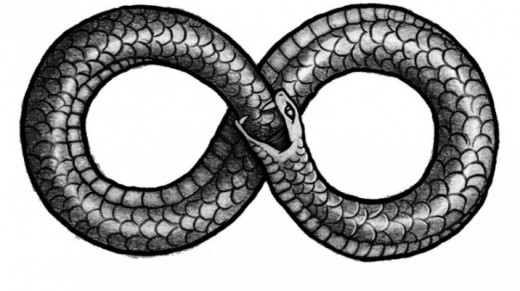
Get this book of great poetry by the author of "Eternal Multiverse" on Amazon
Eternity Everlasting
In this paper, I use “eternal” to mean both timeless and everlasting. In philosophy, the term for everlasting is actually “sempiternal.” But the multiversal fabric I attempt to describe exists, by necessity, both outside of time and has evolutionary agency within infinite time. These are indeed characteristics of God traditional as well, but our multiverse doesn’t need the other characteristics attributed to God in order to exist as it does. Merriam-Webster defines time thusly:
a : the measured or measurable period during which an action, process, or condition exists or continues : duration
b : a nonspatial continuum that is measured in terms of events which succeed one another from past through present to future
It is entirely possible that time, as defined above, does not exist. The multiverse may indeed be timeless, while we have evolved perceptual apparatus that allow us to separate and sequence phenomena into what we call events. For practical purposes, let’s assume that time, as defined above, does exist.
It is a human bias of logic and a paradoxical result of our causal thinking that we believe there had to be nothing originally. We tend to compare the multiverse to our small endeavors such as manufacture. Products go from idea (defined as a non-physical apparent nothingness) to store shelves every day. There is indeed a law of causality. But ontologically speaking, a cosmological nothing means that there is absolutely no thing, physical or otherwise. There is no good rationale to oppose the idea that something (rather than nothing) was the original state of the multiverse and thus eternal. The logic of eternal material is entirely consistent. So, true nothingness could never have existed, because if it was truly nothing, it had nothing inherent within it to allow something to emerge. Now, we see that there is obviously something. We are not quite sure of the nature of the something in which we live and breathe, but we have termed these various possible somethings “matter,” “consciousness,” “thought,” “energy,” “Physical laws,” "strings," “the Matrix,” etc. And while they must, ipso facto, be manifestations of the original one, they may also be quite different emergent properties. On the other hand, they may all be the same phenomenon, and it is our view of them, our perceptual biases, that give them their apparently unique properties.
The Logical Steps to Eternity
1. I think, therefore I am (I exist, I am something).
2. There is something (by 1; I am conscious of it right now, though I don’t know of what it is made).
3. Nothing = the complete absence of anything physical or non-physical.
4. The Law of Causality = every change in nature is produced by some cause
5. Something cannot come from nothing (by 3 and 4; there is nothing from which to build any something. Nothing to cause the existence of something.).
6. Eternity = Always and Forever
7. Something is Eternal. There has always been something (by 4, 5 and 6; We don’t yet know the ultimate foundations of what we observe, nor what was the eternal something that existed before the non-eternal somethings). Corollary: there has never been “nothing.”
Very few scientific papers have been written on the subject of an eternal multiverse, with our universe being just one of infinite emergent and finite local perturbations - none of any significant scope. When it is mentioned, it is broached in passing, in the context of other problems. It seems that most physicists believe that the multiverse is a philosophical construct and unscientific. As Paul Davies states in his 2003 NY Times opinion piece, A Brief History of the Multiverse:
For a start, how is the existence of the other universes to be tested? To be sure, all cosmologists accept that there are some regions of the universe that lie beyond the reach of our telescopes, but somewhere on the slippery slope between that and the idea that there are an infinite number of universes, credibility reaches a limit. As one slips down that slope, more and more must be accepted on faith, and less and less is open to scientific verification. Extreme multiverse explanations are therefore reminiscent of theological discussions. Indeed, invoking an infinity of unseen universes to explain the unusual features of the one we do see is just as ad hoc as invoking an unseen Creator. The multiverse theory may be dressed up in scientific language, but in essence it requires the same leap of faith.3
Indeed, he is right that these assumptions cannot be scientifically tested. But they are logically consistent. More on this in a moment. When philosophy prompts a theoretical physicist to hypothesize, prompting the construction of mathematical models that become logically consistent, you have something a scientist can sink his teeth into even though the final result not be falsifiable. Many scientists believe philosophy is at least a semantic game, at most a distraction. They seem to forget that science is a method, subsumed under the auspices of philosophy, and mathematics simply a short-hand for describing the methods and its results. They must go hand in hand. Theoretical physics is an important field that both Hawking and Krauss engage in, but this too is philosophy at its most exciting.
Most theoretical physicists will claim that the math proves that the universe is finite in past-time, but may be eternal into the future. This may be true of our universe, but they tend to ignore the obvious fact that the multiverse (cosmos) is of necessity eternal, probably because scientists these days abhor an infinity (before the CERN supercollider came on line, many tried all they could to prove the universe was eternal, to avoid many problems the alternative would cause to the theories of the day; now, the discovery that particle pairs pop into existence out of some apparent nothingness has them dancing in the streets). They ignore the eternal cosmos as if our universe is the only one, and self-contained in a bubble of space-time “floating” in a sea of absolute nothingness; yet some theories do postulate a multiverse (many parallel universes), again ignoring that every one is an emergent property of an eternal cosmos.
"Multiverse" by Bella Cielo
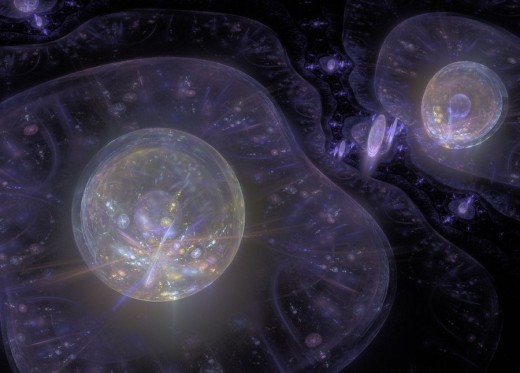
The Multiverse Exists
A. The first law of thermodynamics is a version of the law of conservation of energy, adapted for thermodynamic systems. The law of conservation of energy states that the total energy of an isolated system is constant; energy can be transformed from one form to another, but cannot be created or destroyed.
B. The second law of thermodynamics states that in a natural thermodynamic process, there is an increase in the sum of the entropies of the participating systems.
When speaking of the origins of our universe, scientists use the second law to prove that our universe must have had a beginning. As Henry Morris commented: “The Second Law requires the universe to have had a beginning” (1974, p. 26)4. Otherwise the second law would be violated. Is this really settled law? It seems to me that a universe that must have a beginning (2nd law), contradicts the first law by matter popping into existence from nothing. Oh, yes, they redefined nothing, and balanced out the equations with opposing particle pairs. They continue to evade the issue, even though admitting an eternal cosmos begetting a finite universe removes this paradox.
Using Ockham’s Razor: The Wikipedia entry for “Multiverse” states that “in terms of Kolmogorov complexity, the proposed multiverse is simpler than a single idiosyncratic universe.” Kolmogorov complexity would say that the multiverse uses less computing resources, or bits, to encode an algorithm that describes the information of a multiversal system. Max Tegmark explains:
[A]n entire ensemble is often much simpler than one of its members. This principle can be stated more formally using the notion of algorithmic information content. The algorithmic information content in a number is, roughly speaking, the length of the shortest computer program that will produce that number as output. For example, consider the set of all integers. Which is simpler, the whole set or just one number? Naively, you might think that a single number is simpler, but the entire set can be generated by quite a trivial computer program, whereas a single number can be hugely long. Therefore, the whole set is actually simpler... (Similarly), the higher-level multiverses are simpler. Going from our universe to the Level I multiverse eliminates the need to specify initial conditions, upgrading to Level II eliminates the need to specify physical constants, and the Level IV multiverse eliminates the need to specify anything at all.... A common feature of all four multiverse levels is that the simplest and arguably most elegant theory involves parallel universes by default. To deny the existence of those universes, one needs to complicate the theory by adding experimentally unsupported processes and ad hoc postulates: finite space, wave function collapse and ontological asymmetry. Our judgment therefore comes down to which we find more wasteful and inelegant: many worlds or many words. Perhaps we will gradually get used to the weird ways of our cosmos and find its strangeness to be part of its charm.5
In his lecture, “The Origins of the Universe,” Stephen Hawking states that time needs no beginning, and that’s fortunate, since it doesn’t have one, despite his convoluted “proof.”
…when one combines General Relativity with Quantum Theory, Jim Hartle and I realized that time can behave like another direction in space under extreme conditions. This means one can get rid of the problem of time having a beginning, in a similar way in which we got rid of the edge of the world. Suppose the beginning of the universe was like the South Pole of the earth, with degrees of latitude playing the role of time. The universe would start as a point at the South Pole. As one moves north, the circles of constant latitude, representing the size of the universe, would expand. To ask what happened before the beginning of the universe would become a meaningless question, because there is nothing south of the South Pole.
Time, as measured in degrees of latitude, would have a beginning at the South Pole, but the South Pole is much like any other point, at least so I have been told. I have been to Antarctica, but not to the South Pole. The same laws of Nature hold at the South Pole as in other places. This would remove the age-old objection to the universe having a beginning; that it would be a place where the normal laws broke down. The beginning of the universe would be governed by the laws of science.6
While he is probably correct that our particular universe is not past-eternal, he still provides no evidence for how something can come from nothing, simply positing a bubbling up of particles. His position that time is not infinite shows that he has dismissed the idea of an eternal, parental cosmic fabric. "Nothing is south of the South Pole" is what I like to call "The Hawking Cosmological Cop-out." And the obvious and logically irrefutable is being ignored again. The only other option, really, is that there is no time. Are we ready to go there? Not in this paper. Perhaps the consequences and even the equations are the same either way.
William Lane Craig, the eminent theologian, claims that the Borde-Guth-Vilenkin singularity theorem proves that our universe is not eternal, and says it is a fact that it applies to the multiverse as well.7 How could he know this when it is impossible for us to describe anything outside of our universe other than the knowledge of its eternity and infinite size and scope? Eternality is one descriptive we can say for sure applies to the multiverse and Craig seems to be eschewing it to preserve his version of God.
William of Ockham, c. 1287 – 1347

Implications
The question may thus be: “what is the original something of the cosmos?” Or has the question become “does it really matter?” I don’t think it matters, now that we know it is something and it is eternal. It is this fact of eternality that changes everything and makes the resultant questions even more interesting. So, what does eternality imply?
What eternity does imply is infinite time within which all possibilities are probable. Therefore, while eternal somethingness does not preclude the existence of a God, it does not require it; it renders it redundant. At the same time, eternity says that since a God is possible, as shown by our own rapid evolution into creator beings, it is probable. It all depends on how one defines God. Another thing it implies is infinite size.
More logic – On an infinitely large multiverse:
A. There are functions of infinities. (physicists would prefer to say this applies only to mathematics, that infinities cannot appear in nature, but it turns out that mathematics can describe the real world - who knew?)
B. Eternality is an infinity (by definition).
C. The multiversal fabric is eternal (as proven above)
D. Our universe exists (whatever the nature of it's basic parts - a consensus exists)
E. In an eternal cosmos, if something can exist, it must exist an infinite number of times by step A - that is the nature of eternity and infinity, as defined ).
F. Thus, there are infinite universes.
G. Universes take up space.
H. Therefore, infinite universes imply infinite space.
The limitations of the speed of light, absorption by the interstellar medium, the finitude of our universe, and the expansion of space can resolve Olber’s Paradox of the dark night sky in an infinite universe. This also applies to light from the multiverse entering our universe. In fact, the microwave background radiation observed in our experiments may be the visible light of distant universes shifted to the longer wavelengths of microwaves by the expansion of space.
The laws of our particular universe may not be the same as all other universes. But, the laws of the underlying eternal fabric would be the same everywhere.
Getting back to the first question for a moment, let’s ruminate on the original something of the universe. We rely on the Ockham in all of us when we assume it must be something simple. Let’s assume it was, even though there is really no necessary reason to believe it was. We know there are physical laws which we are mathematically refining every day. We either assume these laws are a result of an invisible, but material, structure permeating the universe, the way elemental, chemical properties determine how different chemicals interact, or we can view them as entirely non-physical and independent of matter, which would imply that all we know is non-physical.
Wouldn’t it then be equally plausible to imagine a something other than God to be the eternal, underlying, creative reality? Creativity need not be sentient nor omnipotent. Science has shown how life can be born of inanimate matter (Read Howard Bloom’s book The God Problem for a brilliant take on this subject) and how that life may evolve over time to eventually become sentient. Consciousness may not require a God or a soul – complexity theory provides a framework for imagining a consciousness emerging at the tipping point of a gradually evolving and increasing physical brain. So, from a purely logical point of view, this seemingly impossible eternal something has equal right to be a substrate of matter as much as a non-material entity such as we call God. (See Rundle, using conservation of mass and energy – matter is the necessary being - page 147)8.
Which would Ockham prefer? Is the initial (and eternal) something some sort of structure much simpler than a full-blown omnipotent God? Or, as Swinburne asserts, is God simpler than a complex universe (1979, page 131)9? I assert that, while God may indeed be simpler than a complex universe, the multiverse may not always have been complex, and our universe is continually being shown to have evolved from an extremely simple origin.
I have shown God to be unnecessary. But I have also posited that He/It is possible, and therefore, in an infinite, eternal cosmos, He exists in some form. How have we defined God in the past? What prompted these definitions? How should we now define God? I tackle these questions, along with more implications of eternity and infinity, in my next paper.
Notes:
1. http://bigthink.com/dr-kakus-universe/can-a-universe-create-itself-out-of-nothing
http://bigthink.com/ideafeed/hawking-god-is-unnecessary
http://bigthink.com/in-their-own-words/we-dont-know-it-all-but-heres-whats-worth-celebrating
2. http://en.wikipedia.org/wiki/Nothing#Physics
3. Davies, Paul (12 April 2003). "A Brief History of the Multiverse". New York Times.
4. Henry Morris. (1974), Scientific Creationism (San Diego, CA: Creation-Life Publishers).
5. Max Tegmark, "Parallel universes. Not just a staple of science fiction, other universes are a direct implication of cosmological observations." Scientific American 2003 May;288(5):40–51
6. http://www.hawking.org.uk/the-origin-of-the-universe.html
7. (William Lane Craig Q&A: Why Can't the Multiverse Be Eternal?) https://www.youtube.com/watch?v=l1ScQ9EBFKM
8. Rundle, Bede, 2004, Why there Is Something rather than Nothing, Oxford: Clarendon Press.Morris,
9. Swinburne, Richard, 1979, The Existence of God, Oxford: Clarendon Press.


